 W
WThe Naxalite–Maoist insurgency is an ongoing conflict between Maoist groups known as Naxalites or Naxals, and the Indian government. The insurgency started after the 2004 formation of the CPI-Maoists – a rebel group consisting of the PWG and the MCC. Their origin can be traced when the Communist Party of India (Marxist) split in 1967, leading to the creation of the Communist Party of India (Marxist–Leninist). In January 2005, talks between the Andhra Pradesh state government and the CPI-Maoists broke down and the rebels accused authorities of not addressing their demands for a written truce, release of prisoners and redistribution of land. The ongoing conflict had taken place over a vast territory with hundreds of people being killed annually in clashes between the CPI-Maoists and the government every year since 2005.
 W
WAbujmarh is a hilly forest area, spread over 4,000 square kilometres (1,500 sq mi) in Chhattisgarh, covering Narayanpur district, Bijapur district and Dantewada district. It is home to indigenous tribes of India, including Gond, Muria, Abuj Maria, and Halbaas. It was only in 2009 that the Government of Chhattisgarh lifted the restriction on the entry of common people in the area imposed in the early 1980s. Geographically isolated and largely inaccessible, the area continues to show no physical presence of the civil administration, and is also known as "liberated-zone" as it is an alleged hub of Naxalite-Maoist insurgency, the banned Communist Party of India (Maoist) and its military wing, People's Liberation Guerilla Army (PLGA), who run a parallel government in the area.
 W
WGaur Chakraborty alias Gour Narayan Chakraborty is the former spokesperson of West Bengal State committee of the Communist Party of India (Maoist). He is one of the senior most person in India who was arrested and detained under Unlawful Activities (Prevention) Act. After seven years of incarceration he was acquitted of all charges under the UAPA.
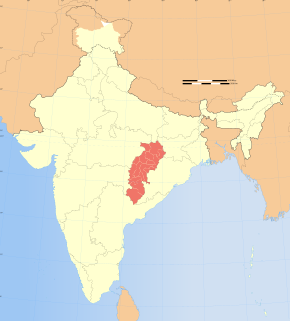 W
WOn 11 March 2014, 15 Indian security personnel and one civilian were shot dead in an attack engineered by Naxals.
 W
WCOBRA is a special operation unit of the Central Reserve Police Force (CRPF) of India proficient in guerrilla tactics and jungle warfare. Originally established to counter the Naxalite problem, CoBRA is deployed to address insurgent groups engaging in asymmetrical warfare. Currently numbering ten battalions, CoBRA is ranked among one of India's most experienced and successful law enforcement units.
 W
WCommunist Party of India (Marxist–Leninist) New Democracy is a communist political party in India. The party was founded as a breakaway from the CPI (ML) of Chandra Pulla Reddy in 1988. The all India general secretary of this party is Yatendra Kumar.
 W
WContinuity and Rupture: Philosophy in the Maoist Terrain is a 2016 book written by J. Moufawad-Paul. The book provides a philosophical analysis of the theoretical foundation of the Marxist school of thought developed by Chinese revolutionary Mao Zedong, Maoism. Moufawad-Paul argues that the political ideology of Maoism, despite being formulated in the 1960s, only achieved full theoretical maturity in 1988 in Peru.
 W
WThe 2010 Dantewada bus bombing occurred on 17 May 2010 when a bus hit a landmine 50 km away from Dantewada, in Chhattisgarh's Dantewada district. Fatalities reports range from 31 to 44, including several Special Police Officers (SPOs) and civilians.
 W
WLal Singh Dil was one of the major revolutionary Punjabi poets emerging out of the Naxalite (Marxist-Leninist) Movement in the Indian Punjab towards the late sixties of the 20th century. The Movement was a political failure and died down quickly, but it brought in revolutionary changes in the subject matter, language and idiom, tone and tenor of Punjabi poetry. Referring to the impact of the Naxalite Movement in Punjab, Paramjit S. Judge says, 'The consequences of the Naxalite movement have been almost ephemeral and have hardly made an impact on the social and political spheres… Its positive contribution is that it has revolutionized Punjabi poetry which can never be traditional and romantic again.' 'The prominent poets belonging to this school are: Pash, Lal Singh Dil, Harbhajan Halvarvi, Darshan Khatkar, Amarjit Chandan and Sant Ram Udasi,' says Paramjit S Judge. About Lal Singh Dil, Prof Ronki Ram says, 'He was one of the most popular and serious poets of the Naxal Movement in Punjab of the late 1960s.'
 W
WSaroj Dutta was an Indian communist intellectual and poet, active in the extremist Naxalite movement in West Bengal in the 1960s. He also remained editor-in-chief of the Amrita Bazar Patrika during the 1940s.
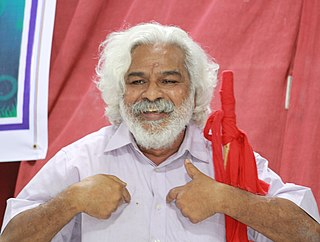 W
WGummadi Vittal Rao, popularly known as Gaddar, is a poet, revolutionary Telugu balladeer and local Naxalite activist from what is now the state of Telangana, India. The name Gaddar was adopted as a tribute to the pre-independence Gadar party which opposed British colonial rule in Punjab during the 1910s.
 W
WAnuradha Ghandy was an Indian communist, writer, and revolutionary leader. She was a member of the banned Communist Party of India (Maoist). She was mostly involved in propaganda, and in CPI's insurgency into urban areas. She was one of the founding members of the Communist Party of India (Marxist–Leninist), in Maharashtra.
 W
WHajar Churashir Maa is a 1974 Bengali novel written by Ramon Magsaysay Award winner Mahasweta Devi. It was written in 1974 on the backdrop of the Naxalite revolution in the Seventies.
 W
WHazaar Chaurasi Ki Maa (1998) is an Indian feature film that deals with the life of a woman who loses her son, a Naxalite, to the violence that is a result of his adopted ideology.
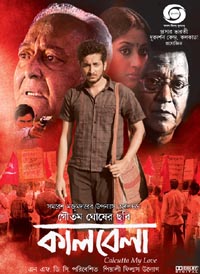 W
Wkaalbela is a 2009 Bengali film directed by Goutam Ghose .The film stars Parambrata Chatterjee, Paoli Dam, Soumitra Chatterjee and Santu Mukherjee. This film is set against the background of the Naxalite movement. Based on a 1980s novel by Samaresh Majumdar, the film sets itself up, quite self-consciously, within a certain tradition of films, namely radical political Bengali cinema of the 1970s and 1980s. It thus establishes an intertextuality and a certain connection with them. By situating itself and the story it has to tell, within this matrix of the 1970s radical Bengali cinema, Ghose anchors the film squarely within that time. The mood and the events certainly, but even the way black and white shots are used, underlines a somewhat documentary – and thus temporally limited – way these sequences are put to use.
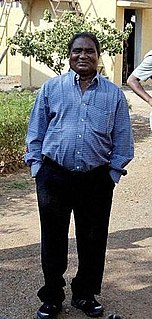 W
WMahendra Karma was an Indian political leader belonging to Indian National Congress from Chhattisgarh. He was the leader of the opposition in the Chhattisgarh Vidhan Sabha from 2004 to 2008. In 2005, he played a top role in organising the Salwa Judum movement against Naxalites, a Maoist group in Chhattisgarh. He was a Minister of Industry and Commerce in the Ajit Jogi cabinet since the state formation in 2000 to 2004. He was assassinated by Naxalites on 25 May 2013 in a Maoist attack while returning from a Parivartan Rally meeting organised by his party in Sukma.
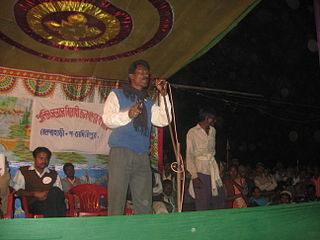 W
WChhatradhar Mahato is an Indian political activist and convict from Lalgarh, West Bengal. He was the convener of the Police Santrash Birodhi Janasadharaner Committee (People's Committee Against Police Atrocities
 W
WThe April 2010 Dantewada Maoist attack was an 6 April 2010 ambush by Naxalite-Maoist insurgents from the Communist Party of India (Maoist) near Chintalnar village in Dantewada district, Chhattisgarh, India, leading to the killing of 76 CRPF policemen and 8 Maoists — the deadliest attack by the Maoists on Indian security forces.
 W
WYalavarthi Naveen Babu, or simply Naveen, was a Naxalite leader in India.
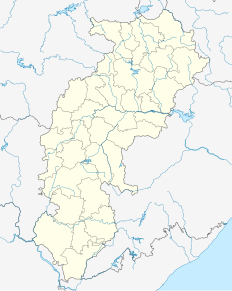 W
WOn 25 May 2013, Naxalite insurgents of the Communist Party of India (Maoist) attacked a convoy of Indian National Congress leaders in the Darbha Valley in the Sukma district of Chhattisgarh, India. The attack caused at least 27 deaths, including that of former state minister Mahendra Karma and Chhattisgarh Congress chief Nand Kumar Patel. Vidya Charan Shukla, a senior Congress leader, succumbed to his injuries on 11 June 2013.
 W
WNaxalbari is a village in the Naxalbari CD block in the Siliguri subdivision of the Darjeeling district in the state of West Bengal, India. Naxalbari is famous for being the site of a 1967 revolt that would eventually lead to the Naxalite–Maoist insurgency.
 W
WA Naxal or Naxalite is a member of any political organisation that claims the legacy of the Communist Party of India (Marxist–Leninist), founded in Calcutta in 1969. The Communist Party of India (Maoist) is the largest existing political group in that lineage today in India.
 W
WA Naxal or Naxalite is a member of any political organisation that claims the legacy of the Communist Party of India (Marxist–Leninist), founded in Calcutta in 1969. The Communist Party of India (Maoist) is the largest existing political group in that lineage today in India.
 W
WSabyasachi Panda is a Naxalite-Maoist leader from India. He was wanted by the state police of several states in India for his involvement in criminal activities. He came into international news in 2012, for his alleged engineering of the kidnapping of two Italians nationals. He is also alleged to have involved and wanted in more than 50 criminal cases, including the murder of Swami Laxamananda Saraswati and four of his aides in Kandhamal district in 2008 that had triggered communal violence in the region. He was expelled by the CPI(Maoist) and then he floated a new party called the Communist Party of India (Marxist–Leninist-Maoist). He was also wanted in the abduction case of two Italian tourists, who were released later in March 2012. On 18 July 2014 Odisha Police raided a Maoist hideout in Ganjam district on the basis of intelligence inputs and arrested Sabyasachi Panda from Berhampur. 45-year-old Sabyasachi Panda carried a cash reward of Rs 5 lakh on his head.
 W
WThe People's Liberation Guerrilla Army (PLGA) is the armed wing of the Communist Party of India (Maoist), a banned organisation in India which aims to overthrow the Indian Government through protracted people's war.
 W
WVaravara Rao is an Indian activist, poet, teacher, and writer from Telangana, India. He is an accused in the 2018 Bhima Koregaon violence and has been arrested under the Unlawful Activities (Prevention) Act.
 W
WThe Red Corridor is the region in the eastern, central and the southern parts of India that experience considerable Naxalite–Maoist insurgency.
 W
WPatel Sudhakar Reddy was a leader of the central committee of the Communist Party of India (Maoist).
 W
WTarimela Nagi Reddy, often called "TN", was a communist politician from Andhra Pradesh, India. He was born in a wealthy family in Anantapur district of Andhra Pradesh. He completed his schooling from the Rishi Valley School India, founded by Andhra philosopher Jiddu Krishnamurti. He would later study at Loyola College in Chennai and at Banaras Hindu University in Varanasi. During his student days, he got involved with nationalism and Marxism. His political activities got him jailed in 1940, 1941 and 1946. He revolted against his father who was a landlord and donated his land of over 1000 acres to landless labourers.
Kanu Sanyal,, was an Indian communist politician. In 1967, he was one of the main leaders of the Naxalbari uprising and in 1969 he was one of the founding leaders of Communist Party of India (Marxist-Leninist). Sanyal committed suicide on 23 March 2010.
 W
WAssistant Commandant Pramod Kumar Satapathy, AC was an Police Officer of the Special Operation Group of Odisha Special Armed Police, which comes under India's Odisha Police who was awarded India's highest peace time gallantry award Ashoka Chakra.
 W
WBinayak Sen is a paediatrician, and public health specialist. He is the national Vice-President of the People's Union for Civil Liberties (PUCL). He is the recipient of several awards including the Jonathan Mann Award, the Gwangju Prize for Human Rights, and the Gandhi International Peace Award. He has been convicted for sedition by a local Court in India which was later upheld by the High Court of Chhattisgarh. He was subsequently granted bail by the Supreme Court of India on appeal. He is a member of the policy group for Police Reforms of Aam Aadmi Party.
 W
WMimlu Sen is an Indian author, translator, musician, composer and producer.
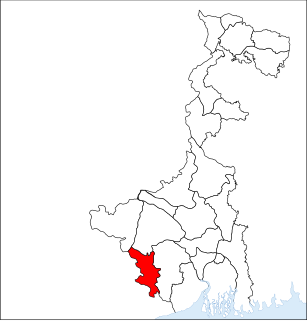 W
WThe Silda camp attack occurred on 15 February 2010, when dozens of Naxalite Maoist insurgents ambushed Indian security forces in Silda in West Bengal, India. The resulting death of 24 paramilitary personnel of the Eastern Frontier Rifles, and several believed to be abducted, made the attack a hard blow to the government's fight against the rebels.
 W
WSoni Sori is an Adivasi school teacher turned political leader of Aam Aadmi Party in Sameli village of Dantewada in south Bastar, Chhattisgarh, India. She was arrested by the Delhi Police's Crime Branch for Chhattisgarh Police in 2011 on charges of acting as a conduit for Maoists. During her imprisonment, she was tortured and sexually assaulted by Chhattisgarh state police. By April 2013, the Indian Courts had acquitted her in six of the eight cases filed against her due to lack of evidence. After release from prison, Sori began campaigning for the rights of those caught up in the conflict between Maoist insurgents and the government, in particular criticising police violence against tribespeople in the region.